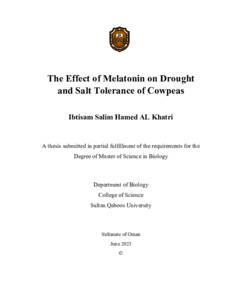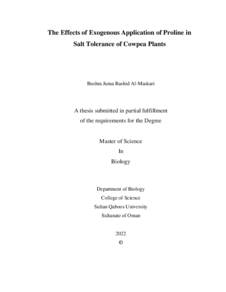وثيقة
The Effect of melatonin on drought and salt tolerance of cowpeas.
الناشر
Sultan Qaboos University.
ميلادي
2023
اللغة
الأنجليزية
الملخص الإنجليزي
Drought and salinity are the major abiotic factors that induce water stress in plants,
consequently lowering crop productivity. Oman is considered an arid region, where
the limited rainfall, high temperature, and overusing of aquifers water influence soil
salinization and drought. Cowpeas (Vigna unguiculata) plants can tolerate poorly
fertilized soil and harsh environmental conditions, including drought and salinity. The
phytohormone melatonin (MT) is produced in high concentrations by plants under
environmental stresses and it acts as an antioxidant. The current study aimed to
investigate the effect of MT on cowpea plants' tolerance to salt and drought stress. The
optimization experiment used salt stress (150 mM NaCl), in which cowpeas were
grown for one week, then exposed to salt stress for two weeks, and foliar application
of different MT concentrations (25-400 µM). Cowpeas seedlings were exposed to two
drought conditions (moderate and severe) for four weeks. Various growth and stress
tolerance parameters were measured upon treating the plants with MT. This includes
photosynthetic characteristics, chlorophyll pigments, and cowpea's antioxidant
defense capacity changes in the enzymatic and nonenzymatic systems.
The results showed that A 300 µM concentration was the most effective concentration
of MT that promotes salt and drought tolerance of cowpea. Plant height and leaf area
were significantly enhanced by MT treatment by 32.36% and 39.36%, respectively,
compared to salt-stressed cowpeas. MT supplementation raised stomatal conductance
(gs) and photosynthesis rate (A) by 60% and 29.4%, respectively, compared to salt stressed cowpeas. Similarly, MT promoted plant height and leaf area under severe
drought stress by 13.63% and 18.75 respectively. Moreover, it increased gs and A by
56.6% and 29.5%, respectively. In addition, MT raised the enzymatic antioxidant
activity (SOD and CAT) and osmolytes (proline and flavonoids), reduced hydrogen
peroxide levels, and regulated Na+ accumulations in leaves in stressed cowpeas plants.
Overall, the foliar application of MT enhanced plant growth and photosynthesis in salt
and drought-stressed seedlings and strengthened the antioxidant system. This study
can mediate further research on cowpea plants in the Omani environment.
المجموعة
URL المصدر
الملخص العربي
يعتبر الجفاف والملوحة من العوامل غير الحيوية الرئيسية التي تسبب الإجهاد المائي في النباتات، وبالتالي انخفاض إنتاجية المحاصيل. تعتبر عمان منطقة قاحلة، حيث تؤثر الأمطار المحدودة وارتفاع درجة الحرارة والإفراط في استخدام المياه الجوفية على تملح التربة والجفاف. يمكن لنباتات اللوبيا ( Vigna unguiculata (أن تتحمل التربة سيئة الإخصاب والظروف البيئية القاسية، بما في ذلك الجفاف والملوحة. يتم إنتاج هرمون الميلاتونين النباتي (MT (بتراكيز عالية بواسطة النباتات تحت ضغوط بيئية ويعمل كمضاد للأكسدة. هدفت الدراسة الحالية إلى التحقيق في تأثير MT على تحمل نباتات اللوبيا ضد الإجهاد والملح والجفاف. أجريت تجربة التحسين باستخدام إجهاد الملح (150 ملي مول كلوريد الصوديوم)، حيث نمت اللوبيا لمدة أسبوع ثم تعرضت لضغط الملح لمدة أسبوعين، مع ال تطبيق الورقي (الرش) ل MT بتركيزات مختلفة (400-25 ميكرومول). تعرضت شتلات اللوبيا لمستويين من الجفاف (متوسط وحاد) لمدة أربعة أسابيع. تم قياس خصائص النمو وتحمل الإجهاد المختلفة عند معالجة النباتات باستخدام MT. يتضمن ذلك خصائص التمثيل الضوئي، وأصباغ الكلوروفيل، وتغيرات القدرة الدفاعية المضادة للأكسدة للوبيا على الأنظمة الأنزيمية وغير الأنزيمية. أوضحت النتائج أن تركيز 300 ميكرومول من MT كان هو التركيز الأكثر فعالية الذي يعزز تحمل الملح والجفاف للوبيا. تم تحسين ارتفاع النبات ومساحة الورقة بشكل كبير عن طريق المعالجة بال MT بنسبة ٪32.36 و٪39.36 على التوالي مقارنة مع اللوبيا المجهدة بالملح. أدى MT إلى زيادة اللإنفتاح الثغري (gs (ومعدل التمثيل الضوئي (A (بنسبة ٪60 و٪29.4 على التوالي مقارنة مع اللوبيا المجهدة بالملح. وبالمثل، عزز MT ارتفاع النبات ومساحة الأوراق تحت إجهاد الجفاف الشديد بنسبة ٪13.63 و18.75 ٪ على التوالي. علاوة على ذلك، زيادة في gs وA بنسبة ٪56.6 و٪29.5 على التوالي. بالإضافة إلى ذلك، رفع MT النشاط الأنزيمي المضاد للأكسدة (SOD وCAT (والأسموليت ( proline وflavonoids(، وخفض مستويات بيروكسيد الهيدروجين، ونظم تراكمات الصوديوم في أوراق نبات اللوبيا. بشكل عام، عزز التطبيق الورقي لـ MT نمو النبات والتمثيل الضوئي في الشتلات المجهدة بالملح وبالجفاف وعزز نظام مضادات الأكسدة. يمكن لهذه الدراسة أن تتوسط في إجراء مزيد من الأبحاث حول نباتات اللوبيا في البيئة العمانية.
قالب العنصر
الرسائل والأطروحات الجامعية


